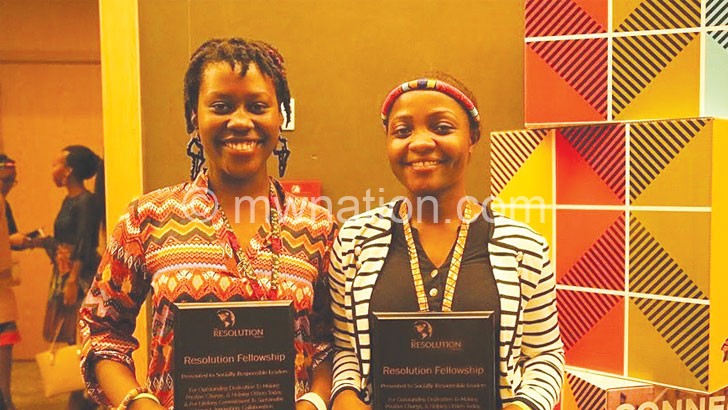Mushroom farming empowers unemployed youths
Farmers in Malawi grow maize as a staple food crop and once harvested, the remains, consisting of leaves, stalks and cobs, are either burned or left to waste.
However, two young men have devised a solution that turns these maize stovers, as they are commonly called, into a usable product and a source of income for women and youths.
Two young Malawians—Jireh Mwamukonda and Yamikani Ng’ona— Mastercard Foundation Scholars at Earth University in Costa Rica, are applying their agricultural engineering skills to introduce oyster mushroom farming to Mzuzu.
Through a social venture called Musheco Farm, the two scholars convert maize stover biomass into fertiliser, making mushroom cultivation sustainable, accessible and environmentally friendly. Maize stovers are freely available on farms and are a good source of organic fertiliser.

Ng’ona (L) and Mwamukonda at the Mastercard Foundation Baobab Summit in Kigali, Rwanda
Trading Economics for Malawi 2018 figures show that 74 percent of the country’s population of 18 million live below the poverty line.
A survey conducted on the study of gender analysis in 2017 showed that women have been left as sole providers in most households in Mzuzu and up to 324 000 youths are unemployed in the city despite having been trained in different fields.
For these groups, Musheco represents a stable source of income.
Musheco Farm will be paying two people to grow mushrooms to sell to local shops and restaurants. They will also train and mentor unemployed youths and women belonging to small groups such as village banks and youth groups, on cultivating mushrooms in sustainable and innovative ways regardless of the amount of land available.
Musheco takes a holistic and phased approach to training eligible participants. The first phase focuses on soft skills such as communication, leadership, attitude and teamwork.
During the second phase, participants learn what it takes to run a successful business by exploring different types of marketing strategies. Learning how to grow mushrooms takes place during the last phase.
The farm will train up to 15 people in three-month intervals, targeting a total of 60 farmers each year.
“The farmers will be assigned to teams and will work together,” said Ng’ona. “Once trained, they will have the skills to run their own mushroom farms and generate income to sustain their families.”
Because mushrooms are a great source of protein, farmers are encouraged to eat the mushrooms at home and sell any excess to Musheco Farm.
The farm then aggregates all the farmers’ yields and sells them to a supplier who will sell them to different outlets such as hotels, supermarkets and retail shops. Payment is direct from Musheco to the farmers.
To enrol for the programme, farmers pay a fee of $7 (about K6 000).
“The enrolment fee will be used to produce the learning materials that the training centre will need,” said Mwamukonda.
Musheco Farm won the 2019 Resolution Social Venture Challenge, a competition that rewards compelling leadership and promising social ventures led by youths.
These young leaders and change-makers earned a fellowship that included seed funding, mentorship and access to a network of young global change-makers to pursue impactful projects in their communities.
Collaboration between the Mastercard Foundation and The Resolution Project, the Resolution Social Venture Challenge provides a pathway to action for socially-responsible young leaders who want to create change that matters in their communities.
As the team awaits certification from the Malawi Bureau of Standards (MBS), the two youths are happy that they won the Social Venture Challenge, which has enabled them to realise their dream.
“This has been one of the greatest achievements in my life so far,” said Ng’ona. “I am thankful to all the people that have helped make Musheco Farm a reality. To all African youths, I want them to know that one of the ways to help our communities is by creating job opportunities through social entrepreneurships.
“Whatever vision you have, the time to do it is now. You don’t need to have a perfect plan, just start it.”
“I feel privileged to receive this award not only for the funding it offers, but also for the connections and network I will gain through being a Resolution Fellow,” said Mwamukonda. “It’s about the continuous mentorship that we are going to receive throughout the implementation of the project and even after that. This is a lifetime benefit,” he said.





One Comment